
Mahavatar Babaji is the name given to his guru by Indian Yogi Yogiraj Lahiri Mahasaya (1828–1895), and several of his disciples, who reportedly appeared to them between 1861 and 1985, as described in various publications and biographies. According to Yogananda's autobiography, Babaji has resided for at least hundreds of years in the remote Himalayan regions of India, seen in person by only a small number of disciples and others.
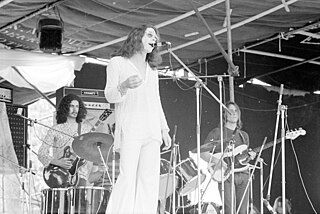
Quintessence was a rock band formed in April 1969 in Notting Hill, London, England. Their style was a mixture of jazz, psychedelic rock and progressive rock with an influence of music from India.

Wonderwall Music is the debut solo album by English musician George Harrison and the soundtrack to the 1968 film Wonderwall, directed by Joe Massot. Released in November 1968, it was the first solo album by a member of the Beatles, and the first album issued on the band's Apple record label. The songs are all instrumental pieces, except for occasional non-English language vocals, and mostly comprise short musical vignettes. Following his Indian-styled compositions for the Beatles since 1966, he used the film score to further promote Indian classical music by introducing rock audiences to instruments that were relatively little-known in the West – including shehnai, sarod, tar shehnai, tanpura and santoor. The Indian pieces are contrasted by Western musical selections, in the psychedelic rock, experimental, country and ragtime styles.

"Within You Without You" is a song by the English rock band the Beatles from their 1967 album Sgt. Pepper's Lonely Hearts Club Band. Written by lead guitarist George Harrison, it was his second composition in the Indian classical style, after "Love You To", and inspired by his stay in India in late 1966 with his mentor and sitar teacher Ravi Shankar. Recorded in London without the other Beatles, it features Indian instrumentation such as sitar, tambura, dilruba and tabla, and was performed by Harrison and members of the Asian Music Circle. The recording marked a significant departure from the Beatles' previous work; musically, it evokes the Indian devotional tradition, while the overtly spiritual quality of the lyrics reflects Harrison's absorption in Hindu philosophy and the teachings of the Vedas.

Quintessence is the second studio album by the English group Quintessence.

Greasy Truckers Party is a 1972 live album by various artists recorded at a February 1972 Greasy Truckers concert at the Roundhouse in London. The concert featured three bands, Man, Brinsley Schwarz, and Hawkwind, and musician Magic Michael. Originally a double vinyl album, in a limited edition of 20,000 and sold at just £1.50, it rapidly sold out, and became a collector's item.
In the world of British underground rock, the Greasy Truckers Party ... ... looms about as large as the Monterey International Pop Festival does in American rock lore; it wasn't the biggest gig ever played by the bands involved, but for reasons of exposure, and resulting word-of-mouth, and the excerpted live album that followed, it came to define what they were capable of.
John Barham is an English classical pianist, composer, arranger, producer and educator. He is best known for his orchestration of George Harrison albums such as All Things Must Pass (1970) and for his association with Indian sitar maestro Ravi Shankar.
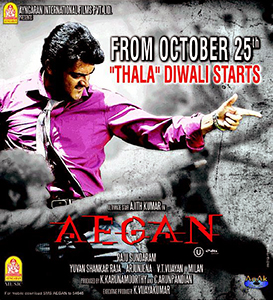
Aegan is a 2008 Indian Tamil-language action comedy film directed and co-written by Raju Sundaram and produced by Ayngaran International. It stars Ajith Kumar and Nayanthara, with Suman, Jayaram, Nassar, Navdeep, and Piaa Bajpai in supporting roles. The music was composed by Yuvan Shankar Raja with cinematography by Arjun Jena and editing by V. T. Vijayan. It is based on the 2004 Indian film, Main Hoon Na.

Saroja is a 2008 Indian Tamil-language comedy thriller film written and directed by Venkat Prabhu and produced by T. Siva. It stars Shiva, Vaibhav, Premji, S. P. B. Charan, and Vega Tamotia, while Jayaram, Prakash Raj, Sampath Raj, Nikita Thukral, Bose Venkat and Kajal Aggarwal play other vital roles. Several other popular Tamil television artists and crew members make special appearances throughout the film. The score and soundtrack were composed by Yuvan Shankar Raja with cinematography by Sakthi Saravanan.

The Mystery of the Yeti is a Goa trance concept album conceived and arranged by Ron Rothfield. It was collaboratively produced by Raja Ram and Graham Wood of The Infinity Project; Stéphane Holweck, Loïc Van Poucke, and Serge Souque ; and Simon Posford.
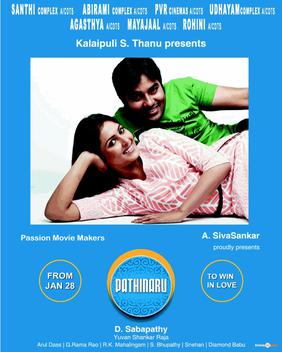
Pathinaaru (transl. Sixteen) is a 2011 Tamil-language romantic drama film written and directed by Sabapathy Dekshinamurthy, who previously directed the films V.I.P (1997), Punnagai Poove (2003) and A Aa E Ee (2009). It stars Shiva and Madhu Shalini. The film's background score and soundtrack was composed by Yuvan Shankar Raja. After being launched in October 2008 under the title 16, the film was shot for over one year, wrapping in early 2010. A year after completion, Kalaipuli S. Thanu bought the distribution rights and released the film on 28 January 2011 under his V. Creations banner. However, it was financially unsuccessful. Despite that, it was remade as Jolly Boy in Kannada language.

Bumpers is a double sampler album from Island Records, released in Europe and Australasia in 1970; there were minor variations in track listings within Europe but the Australian release was fundamentally different. The title refers to the basketball-style shoes on the front of the album cover and to the meaning "unusually large, abundant or excellent". The album is left to present itself: there are no sleeve notes; the gatefold interior consists of a photograph showing publicity shots of the featured acts attached to the stump of a tree on a seemingly wet and gloomy day, without any identification. This image is flanked on each side by the track listings, but even there, the information given is unreliable. Unlike its predecessors You Can All Join In and Nice Enough To Eat, there are no credits for cover art. [It was in fact by Tony Wright - his first sleeve for Island.] The English version of the album came out in two pressings, first with the pink label and "i" logo, and later with the palm motif on a white background and pink rim, each version with some minor variations in the production of individual tracks.

Dive Deep is the third studio album by the English group Quintessence.
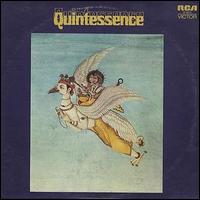
Self is the fourth studio album by the English group Quintessence. It was the final album by the band to feature Maha Dev and Shiva Shankar Jones as both were fired from the band by Raja Ram prior to the release of Indweller.
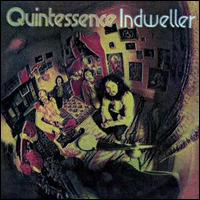
Indweller is the fifth and last studio album by the English group Quintessence. Maha Dev and Shiva Shankar Jones had been fired from the band prior to the recording of this album, making this the only album on which they do not feature.
Sumitra Charat Ram was a noted Indian arts patron, impresario and the founder of Shriram Bharatiya Kala Kendra (SBKK) established in 1952. She played a key role in the revival of performing arts, especially Kathak, in the post-independence era, for which she received a Padma Shri Award.

Chants of India is an album by Indian musician Ravi Shankar released in 1997 on Angel Records. Produced by his friend and sometime collaborator George Harrison, the album consists of Vedic and other Hindu sacred prayers set to music, marking a departure from Shankar's more familiar work in the field of Hindustani classical music. The lyrical themes of the recorded chants are peace and harmony among nature and all creatures. Sessions for the album took place in the Indian city of Madras and at Harrison's home in Henley-on-Thames, Oxfordshire, following his work on The Beatles' Anthology (1995). Anoushka Shankar, John Barham, Bikram Ghosh, Tarun Bhatacharaya and Ronu Majumdar are among the many musicians who contributed to the recording.

West Meets East is an album by American violinist Yehudi Menuhin and Indian sitar virtuoso Ravi Shankar, released in Britain in January 1967. It was recorded following their successful duet in June 1966 at the Bath Musical Festival, where they had played some of the same material.
Shambhu Das is an Indian classical musician and educator. He is best known for his long association with Ravi Shankar, on whose behalf Das has acted as an ambassador for Indian music in Canada since the early 1970s, and his friendship with George Harrison of the Beatles, whom Das helped teach sitar in 1966. His assistance in Harrison's immersion in Indian culture helped inspire the Beatles' career direction and, due to the band's popularity and influence, the direction of the 1960s counterculture. In 1970, Das established the Indian Music Department at Toronto's York University, where he taught for four years.
















